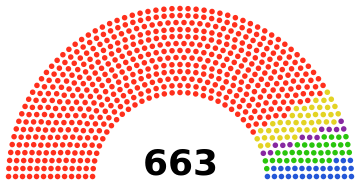The State Assembly is the principal organ of government of New Vanguardia. It is considered to be a unicameral assembly, meaning that all of its members are members of the same body, but the State Assembly is not a simple voting body: it is a complex political machine that directly orders almost every aspect of state and government. The State Assembly meets in Sovereign Hall, located in the state capital of Riverside.
There are 663 selectors in the State Assembly. 199 of these (about 30%) are elected by province, while the remaining 464 are elected via national party list. According to the Basic Law the maximum duration (or term) of an Assembly conference is five years.
State Assembly Membership by Party

- 546 seats — General People’s Party (red)
- 42 seats — Science and Industry Party (yellow)
- 13 seats — Public Interest Party (purple)
- 34 seats — Constitutionalist Party (green)
- 28 seats — Party of the January 31 Movement (blue)
A full session of the State Assembly is called a meeting of the Plenary Committee (or Plenum), whose resolutions carry the full authority of the state. At the beginning of each conference, the new class of selectors appoint two of their number to be the officers of the Assembly: the President, who is the presiding officer; and the Chancellor, who is the functionary officer. The President’s role is to ensure the Assembly operates in good order, while the Chancellor’s role is to provide for continuity by keeping records and registering events.
Sessions of the State Assembly are not normally chaired by the President but by a Recorder, a selector who is appointed to the role for the duration of the session; neither the President nor the Chancellor can serve as a Recorder. Multiple sessions may be held in a day, and each one requires the Recorder to be re-appointed. The State Assembly’s procedure also makes a space for the “host” of an event, a position which is not strictly appointed by the Assembly. Instead, the role of Steward (who stands in for the host/owners of the meetingplace) is typically held by an employee of the Public Commission for the Maintenance of Public Works, the entity which has charge over Sovereign Hall.
Much of the State Assembly’s business is conducted by its Committees, to which one selector is appointed as Delegate or presiding officer over the Committee. Some Committees have executive powers and responsibilities delegated to them as well. These Committees will also appoint a Commissioner as functionary officer. The Commissioner acts as the chief officer of the Committee’s Agency while the Committee acts as an oversight board. These executive Committee–Agencies are called State Commissions. Other Committees are simply called “Committees of the State Assembly”.
The Delegates of all the State Commissions become members of the Guidance Committee, which is roughly equivalent to a Council of Ministers; the President sits as ex officio chair of this Committee. The Delegates of all Assembly Committees, including those of the State Commissions, are joined by a number of specially-appointed selectors to form the Debate Committee, which effectively sets the agenda for meetings of the full Assembly. The Chancellor is ex officio chair of the Debate Committee.
Committees of the State Assembly
Main committees
- Plenary Committee
- Guidance Committee
- Debate Committee
State Commissions
- State Commission for the Judiciary
- State Commission for Labor and Internal Affairs
- State Commission for Finance
- State Commission for Diplomacy and Foreign Affairs
- State Commission for the Military
- State Commission for Education
- State Audit Commission
- State Revenues Commission
- State Commission for Health and Welfare
- State Commission for Economy
- State Commission for Planning
- State Commission for Demographics
Non-executive committees
- Budget Committee
- Discretionary Committee
- Ethics Committee
- Juridical Committee
- Provinces Committee
- Public Welfare Committee
- Rules Committee
- State Service Committee
- Survey Committee

